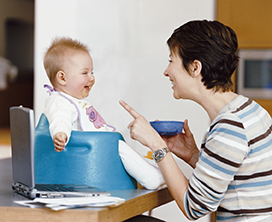A new discovery to be published in the journal Developmental Science reports that speech directed to 11- to 14-month-old infants predicts both their concurrent and future language accomplishments, and points to practical information useful for parents.
The first factor linked to success in language is the use of “parentese” (rather than standard adult-directed speech). The second factor predicting success is the “social context” in which language occurs: the more adults addressed infants in one-on-one social contexts the greater  their language skills. The data suggest that quality not simply the quantity makes a difference.
their language skills. The data suggest that quality not simply the quantity makes a difference.
In the study, audio input to 26 children aged 11- to-14-months was recorded over a period of 4 days at home. Infants wore lightweight vests containing high quality mini recorders. The recordings captured everything the infants heard over a 4-day period. Specially designed software allowed I-LABS researchers to locate periods on the recordings during which language was addressed to the child.
Children came to I-LABS at age 2 to assess their language skills. The results show that both the amount of babbling recorded at home in the 11-14 period and language at the age of 2 was advanced in children who heard more parentese and who were spoken to in one-on-one conversations. The study is the first to examine the use of parentese in home settings, and also the first to suggest that the social context in which learning occurs matters.
Read the UW Press Release
Read the Journal Publication
Multimedia
Slate Magazine
Dr. Patricia Kuhl on KUOW (NPR affiliate)
KIRO Radio Special
Print Media
The Daily
Washington Post
Seattle Times
Seattle PI
KIRO
The Times of London
Daily Mail (UK)
The Korea Times
ABC WWSB Florida
Parent Herald
Business Insider
Science World Report
Futurity